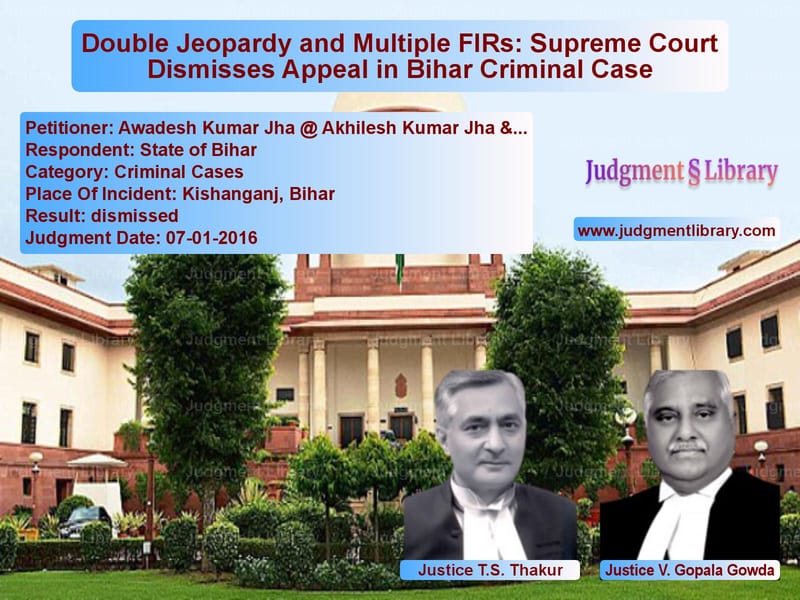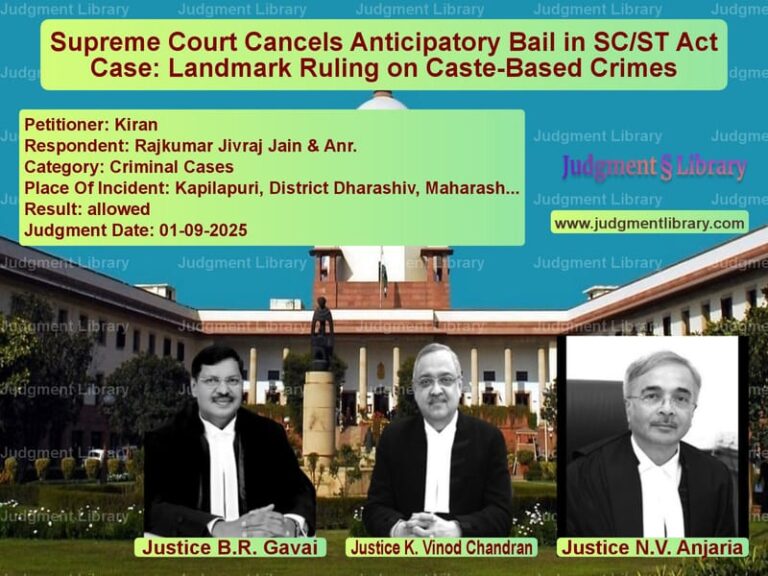Double Jeopardy and Multiple FIRs: Supreme Court Dismisses Appeal in Bihar Criminal Case
The case of Awadesh Kumar Jha @ Akhilesh Kumar Jha & Anr. v. State of Bihar is a crucial ruling by the Supreme Court addressing the legality of multiple First Information Reports (FIRs) for offenses arising from the same transaction. The appellants had challenged the registration of a second FIR after being arrested in a raid under the Immoral Traffic (Prevention) Act, 1956. The Supreme Court dismissed the appeal, ruling that the second FIR was valid as the offenses alleged therein were distinct and independent.
Background of the Case
The appellants were arrested in a raid conducted on May 4, 2008, at a red-light area in Khagaria, Bihar, following a telephonic tip-off. The first FIR, No. 111 of 2008, was registered against them under Sections 3, 4, 5, 6, and 7 of the Immoral Traffic (Prevention) Act, 1956. The police alleged that the appellants were involved in a sex trafficking racket and were found in objectionable positions with multiple individuals at the scene of the raid.
First FIR and Court Proceedings
Following the registration of the first FIR:
- The appellants were arrested and applied for bail.
- During their bail application, they allegedly provided incorrect personal details regarding their names, father’s names, and residential addresses.
- The police later discovered the discrepancies and registered a second FIR, No. 183 of 2008, on July 3, 2008, under Sections 419 and 420 of the Indian Penal Code (IPC) for providing false information.
Legal Challenge Against the Second FIR
The appellants challenged the second FIR, arguing:
- The offenses alleged in the second FIR were part of the same transaction as the first FIR.
- Registering multiple FIRs for the same set of facts was impermissible under the principle laid down in T.T. Antony v. State of Kerala [(2001) 6 SCC 181].
- The allegations in the second FIR could have been included in the investigation of the first FIR, as per Section 173(8) CrPC.
- The second FIR violated their right against double jeopardy under Article 20(2) of the Constitution of India and Section 300 CrPC.
Judicial Findings Before the Supreme Court
The appellants’ plea for quashing the second FIR was dismissed at multiple levels:
- Judicial Magistrate (First Class), Kishanganj: Rejected their discharge application under Section 239 CrPC on December 4, 2013.
- Sessions Judge, Purnea: Upheld the Magistrate’s order on February 3, 2014.
- Patna High Court: Dismissed their plea on October 14, 2014, stating that the second FIR related to distinct offenses.
Arguments Before the Supreme Court
Petitioners’ Arguments
The appellants, represented by Mr. Akhilesh Kumar Pandey, contended:
- The alleged offense of providing false details was committed during the investigation of the first FIR, making the second FIR invalid.
- The second FIR should be treated as a supplementary investigation under Section 173(8) CrPC rather than as a separate case.
- The High Court had erred in not applying the principle against multiple FIRs established in Amitbhai Anilchandra Shah v. CBI [(2013) 6 SCC 348].
State’s Arguments
The respondent, the State of Bihar, represented by Mr. Rudreshwar Singh, countered:
- The offenses in the second FIR were separate and distinct, involving fraud and misrepresentation.
- The first FIR was related to human trafficking, while the second FIR concerned fraudulent declarations in legal proceedings.
- Each offense merited independent investigation and prosecution.
Supreme Court’s Analysis and Judgment
1. Legality of the Second FIR
The Court distinguished the facts from the precedent in T.T. Antony, ruling:
“The second FIR pertains to an entirely different offense, namely the furnishing of false information, which does not form part of the same transaction as the offenses under the first FIR.”
2. No Violation of Double Jeopardy
The Court rejected the argument based on Article 20(2) of the Constitution and Section 300 CrPC, holding:
“Double jeopardy applies only when a person is prosecuted and punished for the same offense twice. The offenses in the two FIRs are separate in nature.”
3. Section 173(8) CrPC Not Applicable
The Court clarified that the further investigation provision under Section 173(8) CrPC did not apply, as the offenses in the second FIR were independent:
“A second FIR is permissible where subsequent facts disclose distinct and separate offenses, warranting a fresh investigation.”
Final Judgment
The Supreme Court ruled:
- The second FIR was legally valid.
- The appeal was dismissed.
- The trial in the second FIR would proceed as per law.
Key Takeaways
- Multiple FIRs are permissible if they relate to distinct offenses.
- Providing false information during an investigation constitutes a separate offense.
- The principle of double jeopardy does not apply to independent crimes.
- The Supreme Court’s ruling ensures that distinct offenses do not go unpunished due to technicalities.
Conclusion
The judgment in Awadesh Kumar Jha @ Akhilesh Kumar Jha & Anr. v. State of Bihar reaffirms the principle that different offenses arising from a single incident may be prosecuted separately. The ruling provides clarity on the application of double jeopardy and multiple FIRs, ensuring that criminal activities are addressed without procedural hindrances.
Don’t miss out on the full details! Download the complete judgment in PDF format below and gain valuable insights instantly!
Download Judgment: Awadesh Kumar Jha @ vs State of Bihar Supreme Court of India Judgment Dated 07-01-2016.pdf
Direct Downlaod Judgment: Direct downlaod this Judgment
See all petitions in Fraud and Forgery
See all petitions in Custodial Deaths and Police Misconduct
See all petitions in Judgment by T.S. Thakur
See all petitions in Judgment by V. Gopala Gowda
See all petitions in dismissed
See all petitions in supreme court of India judgments January 2016
See all petitions in 2016 judgments
See all posts in Criminal Cases Category
See all allowed petitions in Criminal Cases Category
See all Dismissed petitions in Criminal Cases Category
See all partially allowed petitions in Criminal Cases Category







